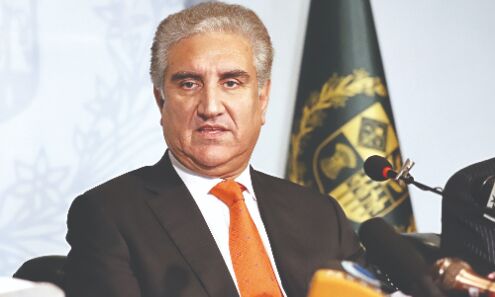Hurdles in peace
The emerging thaw with India has mellowed down the Pakistani approach including that of top leadership, but a faction continues to have a sceptical eye

A flurry of activities is noticed in Pakistan in the wake of the emerging thaw with India emanating from the backchannel diplomacy initiated by the concerned authorities on both sides. They have raised hopes of peace, albeit just for the immediate future. The tone and tenor of the Pakistani establishment, of late, has been less aggressive, conciliatory and non-confrontationist. This looks heartening. The latest of such mellowed syntax was spotted on March 30 when the Pakistani Foreign Minister, who had otherwise been very belligerent, Shah Mahmood Qureshi disclosed that India and Pakistan, both nuclear powers, cannot afford to engage in any war-like situation. He also said that in the recent past, there have been several significant developments that are positive and productive. He touched upon the 2013 Heart of Asia conference where India and Pakistan never criticised each other. Similarly, at the most recent Dushanbe meet, Pakistan Foreign Minister and his Indian counterpart, S Jaishankar refrained from any blame game. This too was heartening.
More importantly, Pakistan Prime Minister Imran Khan has responded to Indian PM's greetings conveyed on Pakistan National Day on March 23. This seems a welcome move as read from the contents of the former's letter. Imran Khan has called for resolving all the outstanding problems including Kashmir as contained in his March 29 letter. Meanwhile, as part of more Confidence Building Measures (CBMs), Pakistan has lifted restrictions on the import of cotton and sugar from India. This is yet another positive sign of coming out of a frozen time as there has been no trade between India and Pakistan since August 2019. Resumption of trade ties is perhaps the first baby step to move further towards firming up a thawing relationship.
However, hawks watching Pakistan, including Ambassador Abdul Basit who was also in India with his country's High Commissioner, have not been very charitable over the backchannel efforts attempting to usher in peace. Another former ambassador of Pakistan, Zamir Akram has joined the sceptics criticising the peace moves. In an opinion piece in a prominent daily, Zamir Akram has come down heavily on the Pakistan government for being a party to the recent process of reconciliation and rapprochement. Questioning the political wisdom of his country, Akram feels that India has buckled under pressure from the new US administration under President Joe Biden to repair ties with Pakistan in an apparent bid to distance it from China so that the US, as part of the Quad strategy, can address the Chinese threat in a more focused manner. Akram also opines that by engaging India in talks, Kashmiris will stand demoralised and their cause impaired. For the Indo-Pak talks, Akram reckons that China and Pakistani people should be taken on board by the Pakistan government for transparency. He quite bluntly feels pessimistic over the developments and rules out any future of the proposed talks or the warming up. Similar articulations are seen in the print media and TV debates as well. Still, there are security and political analysts like Talat Masood who have reacted in an objective and balanced manner. So we see that some see no future in the emerging thaw and they don't even want to give the ongoing positive developments any chance. Such elements may or may not have the backing of the armed forces or the ISI but they continue to air their ire. Such voices can be countered by pacifists through dialogues or media offensives or ignored as long as Prime Minister Imran Khan and Army Chief Gen Qamar Bajwa's rhetoric are devoid of acrimony. Fortunately, they are conspicuously quiet in any acerbic criticism of India except that on the issue of Kashmir, they are maintaining a cautious approach perhaps for domestic consumption. This apart, their stance and that of Foreign Minister SM Qureshi are worth taking note of.
This development notwithstanding, the Pakistani Prime Minister has drawn considerable flak from his opponents and news commentators for having axed Finance Minister Hafeez Sheikh unceremoniously. This has largely augured in bad taste. The speculation that Sheikh was fired for non-performance or having lost the Senate election to PPP strongman, Yusuf Raza Gilani is also far from convincing. It is a strange coincidence that Sheikh's predecessor Asad Umar too was removed unceremoniously amidst his negotiations with the IMF. No explanation can satisfy people's inquisitiveness on Hafeez Sheikh's exit. Sheikh is a former World Bank hand and Imran Khan is sadly mistaken that Sheikh was not in tune with Imran's economic policies aimed at alleviation of poverty. Well-known journalist Zahid Hussain, in his recent commentary in the 'Dawn', has questioned Imran Khan's wisdom in getting rid of Asad Umar even when he was only into the eighth month of his office. Above all, he was inducted to fix the economic ills.
Other than political experts, many others in Pakistan are also blaming Imran Khan for entrusting sweeping powers in the State Bank and as there is a complete absence of focus in undertaking economic reforms. However, the new Finance Minister Hammad Azhar has to double up his efforts to bring back the impaired Pak economy on the rails.
The writer is a retired IPS officer, a security analyst and a former National Security Advisor to the Prime Minister of Mauritius. Views expressed are personal



